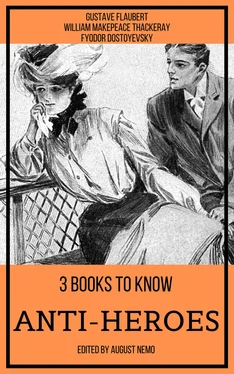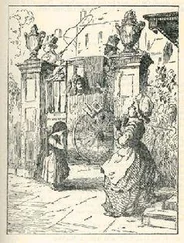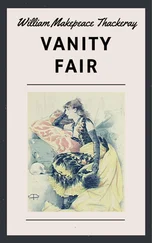CHAPTER V. BARRY FAR FROM MILITARY GLORY
––––––––
AFTER THE DEATH OF my protector, Captain Fagan, I am forced to confess that I fell into the very worst of courses and company. Being a rough soldier of fortune himself, he had never been a favourite with the officers of his regiment; who had a contempt for Irishmen, as Englishmen sometimes will have, and used to mock his brogue, and his blunt uncouth manners. I had been insolent to one or two of them, and had only been screened from punishment by his intercession; especially his successor, Mr. Rawson, had no liking for me, and put another man into the sergeant’s place vacant in his company after the battle of Minden. This act of injustice rendered my service very disagreeable to me; and, instead of seeking to conquer the dislike of my superiors, and win their goodwill by good behaviour, I only sought for means to make my situation easier to me, and grasped at all the amusements in my power. In a foreign country, with the enemy before us, and the people continually under contribution from one side or the other, numberless irregularities were permitted to the troops which would not have been allowed in more peaceable times. I descended gradually to mix with the sergeants, and to share their amusements: drinking and gambling were, I am sorry to say, our principal pastimes; and I fell so readily into their ways, that though only a young lad of seventeen, I was the master of them all in daring wickedness; though there were some among them who, I promise you, were far advanced in the science of every kind of profligacy. I should have been under the provost-marshal’s hands, for a dead certainty, had I continued much longer in the army: but an accident occurred which took me out of the English service in rather a singular manner.
The year in which George II died, our regiment had the honour to be present at the battle of Warburg (where the Marquis of Granby and his horse fully retrieved the discredit which had fallen upon the cavalry since Lord George Sackville’s defalcation at Minden), and where Prince Ferdinand once more completely defeated the Frenchmen. During the action, my lieutenant, Mr. Fakenham, of Fakenham, the gentleman who had threatened me, it may be remembered, with the caning, was struck by a musket-ball in the side. He had shown no want of courage in this or any other occasion where he had been called upon to act against the French; but this was his first wound, and the young gentleman was exceedingly frightened by it. He offered five guineas to be carried into the town, which was hard by; and I and another man, taking him up in a cloak, managed to transport him into a place of decent appearance, where we put him to bed, and where a young surgeon (who desired nothing better than to take himself out of the fire of the musketry) went presently to dress his wound.
In order to get into the house, we had been obliged, it must be confessed, to fire into the locks with our pieces; which summons brought an inhabitant of the house to the door, a very pretty and black-eyed young woman, who lived there with her old half-blind father, a retired Jagdmeister of the Duke of Cassel, hard by. When the French were in the town, Meinherr’s house had suffered like those of his neighbours; and he was at first exceedingly unwilling to accommodate his guests. But the first knocking at the door had the effect of bringing a speedy answer; and Mr. Fakenham, taking a couple of guineas out of a very full purse, speedily convinced the people that they had only to deal with a person of honour.
Leaving the doctor (who was very glad to stop) with his patient, who paid me the stipulated reward, I was returning to my regiment with my other comrade—after having paid, in my German jargon, some deserved compliments to the black-eyed beauty of Warburg, and thinking, with no small envy, how comfortable it would be to be billeted there—when the private who was with me cut short my reveries by suggesting that we should divide the five guineas the lieutenant had given me.
‘There is your share,’ said I, giving the fellow one piece; which was plenty, as I was the leader of the expedition. But he swore a dreadful oath that he would have half; and when I told him to go to a quarter which I shall not name, the fellow, lifting his musket, hit me a blow with the butt-end of it, which sent me lifeless to the ground: when I awoke from my trance, I found myself bleeding with a large wound in the head, and had barely time to stagger back to the house where I had left the lieutenant, when I again fell fainting at the door.
Here I must have been discovered by the surgeon on his issuing out; for when I awoke a second time I found myself in the ground-floor of the house, supported by the black-eyed girl, while the surgeon was copiously bleeding me at the arm. There was another bed in the room where the lieutenant had been laid,—it was that occupied by Gretel, the servant; while Lischen, as my fair one was called, had, till now, slept in the couch where the wounded officer lay.
‘Who are you putting into that bed?’ said he languidly, in German; for the ball had been extracted from his side with much pain and loss of blood.
They told him it was the corporal who had brought him.
‘A corporal?’ said he, in English; ‘turn him out.’ And you may be sure I felt highly complimented by the words. But we were both too faint to compliment or to abuse each other much, and I was put to bed carefully; and, on being undressed, had an opportunity to find that my pockets had been rifled by the English soldier after he had knocked me down. However, I was in good quarters: the young lady who sheltered me presently brought me a refreshing drink; and, as I took it, I could not help pressing the kind hand that gave it me; nor, in truth, did this token of my gratitude seem unwelcome.
This intimacy did not decrease with further acquaintance. I found Lischen the tenderest of nurses. Whenever any delicacy was to be provided for the wounded lieutenant, a share was always sent to the bed opposite his, and to the avaricious man’s no small annoyance. His illness was long. On the second day the fever declared itself; for some nights he was delirious; and I remember it was when a commanding officer was inspecting our quarters, with an intention, very likely, of billeting himself on the house, that the howling and mad words of the patient overhead struck him, and he retired rather frightened. I had been sitting up very comfortably in the lower apartment, for my hurt was quite subsided; and it was only when the officer asked me, with a rough voice, why I was not at my regiment, that I began to reflect how pleasant my quarters were to me, and that I was much better here than crawling under an odious tent with a parcel of tipsy soldiers, or going the night-rounds or rising long before daybreak for drill.
The delirium of Mr. Fakenham gave me a hint, and I determined forthwith to GO MAD. There was a poor fellow about Brady’s Town called ‘Wandering Billy,’ whose insane pranks I had often mimicked as a lad, and I again put them in practice. That night I made an attempt upon Lischen, saluting her with a yell and a grin which frightened her almost out of her wits; and when anybody came I was raving. The blow on the head had disordered my brain; the doctor was ready to vouch for this fact. One night I whispered to him that I was Julius Caesar, and considered him to be my affianced wife Queen Cleopatra, which convinced him of my insanity. Indeed, if Her Majesty had been like my Aesculapius, she must have had a carroty beard, such as is rare in Egypt.
A movement on the part of the French speedily caused an advance on our part. The town was evacuated, except by a few Prussian troops, whose surgeons were to visit the wounded in the place; and, when we were well, we were to be drafted to our regiments. I determined that I never would join mine again. My intention was to make for Holland, almost the only neutral country of Europe in those times, and thence to get a passage somehow to England, and home to dear old Brady’s Town.
Читать дальше












